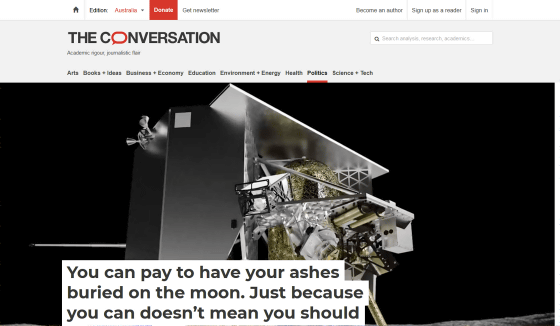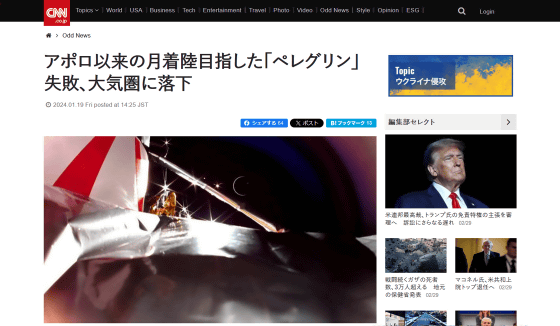What are the problems faced by the 'business of burying civilians' ashes on the moon'?

The American civilian unmanned lunar lander '
You can pay to have your ashes buried on the moon. Just because you can doesn't mean you should
https://theconversation.com/you-can-pay-to-have-your-ashes-buried-on-the-moon-just-because-you-can-doesnt-mean-you-should-220664

Peregrine is a private unmanned lunar lander developed by Astrobotic Technology , an American space development company, and was launched from Cape Canaveral Space Force Station in Florida on January 8, 2024. Peregrine carried various measuring instruments developed by NASA, a small lunar rover by Carnegie Mellon University , equipment developed by scientific missions in Mexico and Germany, as well as civilian payloads not directly related to space exploration. .
The payload that attracted particular attention was the ashes entrusted to us by space funeral service companies Elysium Space and Celestis from customers. Among them were capsules containing the ashes of Star Trek: The Star Wars cast member and original creator and executive producer Rottenberry.
In fact, the business of 'sending capsules containing ashes into space' has been going on for some time, and Elysium Space and Celestis have launched businesses that launch ashes into outer space or into orbit around the Earth for thousands of dollars (hundreds of thousands of yen). ). A ``lunar funeral'' in which ashes are loaded onto Peregrine and sent to the moon was relatively expensive, starting at about $13,000 (about 1.95 million yen).
However, the attempt to ``launch a capsule containing ashes on the moon'' caused a backlash from the Navajo tribe, an indigenous American tribe who consider the moon to be sacred. Buu Nygren of the Navajo Nation, a semi-autonomous territory of the Navajo Nation , said: 'Placing human remains on the moon is a strong desecration of the celestial body we worship. 'This action violates past agreements and commitments of respect and consultation between NASA and the Navajo Nation following the Lunar Prospector mission.'
The Lunar Prospector, a lunar probe launched in 1998, carried the ashes of American astronomer Eugene Shoemaker. Mr. Shoemaker was a person who died unexpectedly in a traffic accident while wishing to ``someday become an astronaut and walk on the moon.'' In order to make Mr. Shoemaker's wish come true, the people who were left behind decided to collect his ashes. They loaded it onto a lunar probe and attempted a ``lunar burial.'' In fact, Mr. Shoemaker is the only 'person buried on the moon' at the time of article creation.
Who is the only person in human history to be buried on the moon? -GIGAZINE

At the time, the Navajo Nation protested sending Shoemaker's ashes to the moon, and NASA agreed to discuss future projects to send his ashes to the moon. However, in a press conference following protests from the Navajo Nation, NASA explained that Peregrine's mission was privately-led, not the U.S. government, and that NASA did not oversee the payload it carried. Masu .
Commercial payloads launched from U.S. soil require approval, but the approval process only covers safety, national security, and foreign policy, and Oliver points out that it does not prevent ashes from being launched if they do not violate those regulations. doing.
It was discovered that Peregrine suffered from problems with its propulsion system after launch, causing a fuel leak. It was determined that it would be impossible to reach the moon, so Peregrine re-entered the atmosphere on January 18 local time and burned up.
Peregrine's attempt to land on the moon, the first since Apollo, fails and falls into the atmosphere - CNN.co.jp
https://www.cnn.co.jp/fringe/35214122.html

As a result, the ashes aboard Peregrine were never buried on the Moon. However, Oliver points out that as space exploration becomes increasingly commercialized, ethical and legal questions are emerging about sending personal items such as ashes to celestial bodies such as the moon. Masu.
The Treaty on the Principles Governing the Activities of States in the Exploration and Use of Outer Space, Including the Moon and Other Celestial Bodies (Outer Space Treaty) , which came into force in 1967, declares that outer space is the domain of all mankind, and that certain nations are It is prohibited to treat it as such. However, this is a treaty that only targets nations, and does not regulate the movements of private companies or individuals. In addition, the Artemis Accord , signed by 32 countries at the time of writing, expands the protection of the historically important lunar surface, but this also does not apply to commercial missions.
Some countries such as Indonesia and New Zealand have space laws that deny the loading of payloads that are contrary to the national interest, but countries such as the United States and Australia do not have such regulations. Humankind has already sent a large amount of artificial objects to outer space, the moon, Mars, etc., including items with cultural value such as those brought by astronauts of the Apollo program. However, Oliver believes that items such as the ashes and hair of civilians sent in for business may have no cultural or historical value.
'We cannot and should not turn back the clock on commercial space,' Oliver said, 'but this mission, which failed with a payload of ashes and vanity, is a challenge to the legal and ethical foundations that underpin commercial operations.' 'It shows that there are unresolved problems in infrastructure, and it's worth pausing to think about future commercialization of space, such as asteroid mining and eventual space colonization.' I did.

Related Posts:
in Science, Posted by log1h_ik






